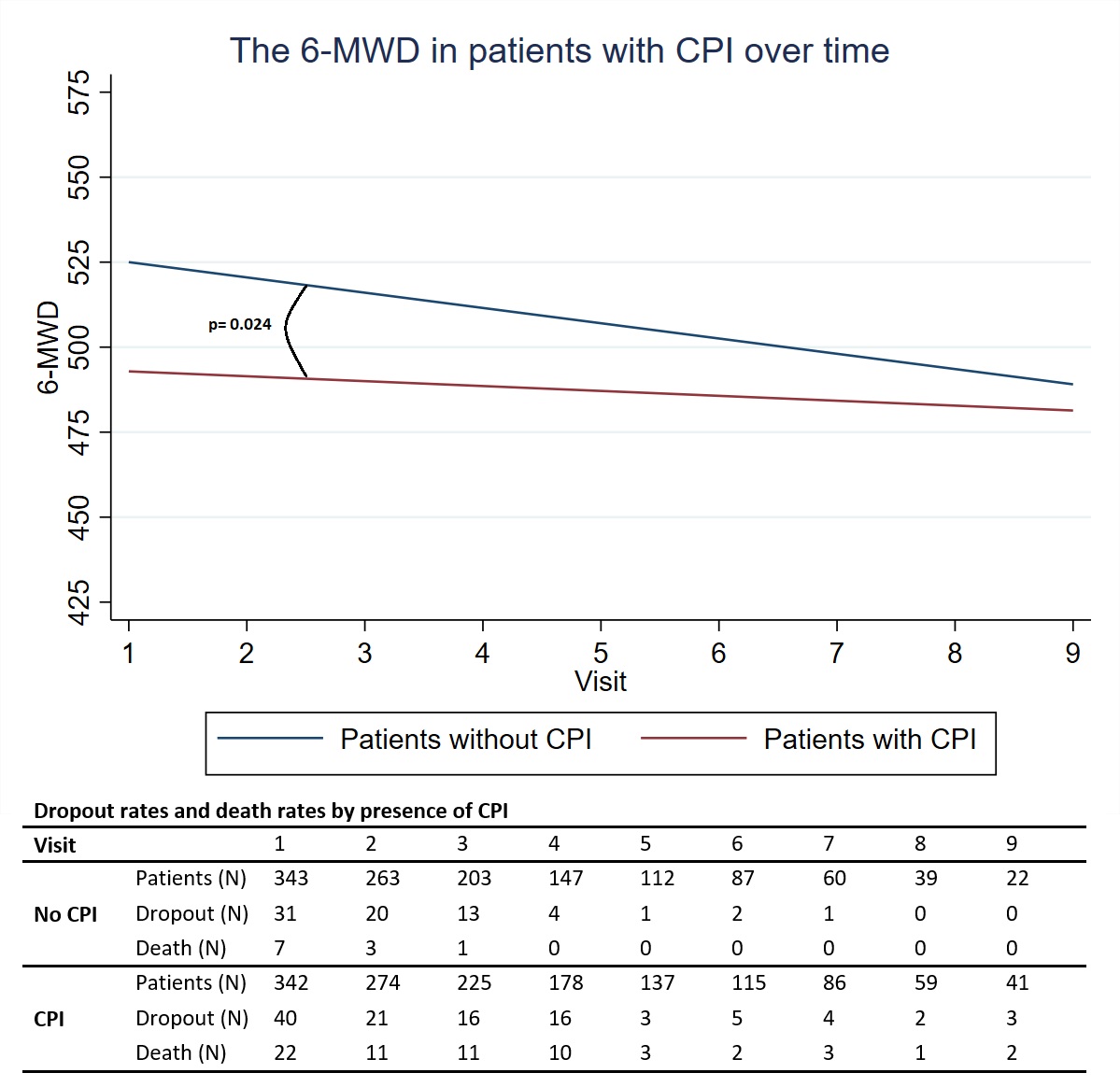Session Information
Date: Sunday, November 12, 2023
Title: (0609–0672) Systemic Sclerosis & Related Disorders – Clinical Poster I: Research
Session Type: Poster Session A
Session Time: 9:00AM-11:00AM
Background/Purpose: Cardiopulmonary involvement (CPI) in systemic sclerosis (SSc) is associated with significant morbidity and mortality. Early detection and timely treatment is warranted. The Six-minute walk test (6-MWT) is a non-invasive exercise test that evaluates the distance a patient can walk in 6 minutes (6-MWD), pre- and post-test heart rate and oxygen saturation. There is ongoing debate about the sensitivity and specificity of the 6-MWT as a screening tool for CPI in SSc. Therefore, this study aimed to assess the course of the 6-MWT parameters over time, its main determinants and the diagnostic value to detect new onset CPI in a large cohort of SSc patients.
Methods: All SSc-patients from the Leiden Combined Care in SSc (CCISS)-cohort, who fulfilled ACR/EULAR 2013 criteria and performed ≥1 6-MWT, were included. CPI included presence of interstitial lung disease (ILD), pulmonary arterial hypertension (PAH) and/or myocardial involvement. Differences in 6-MWT parameters were assessed cross-sectionally at baseline between patients with and without CPI using multivariable linear regression. Course of 6-MWT parameters over time and its main associates were assessed using linear mixed models. Sensitivity and specificity of a decline in 6-MWD distance using a decline of ≥ 33 as cut-off to detect newly developed CPI was determined.
Results: 685 patients were included, with median follow-up duration of 5.4 years and in total 2769 6MWTs available (median 6 [IQR 4-8] 6MWTs per patient). 267 (39%) patients had CPI at baseline, 75 (11%) patients developed CPI during follow-up, 343 (50%) patients did not develop CPI at all. At baseline, 6 Minute walking distance (6-MWD) was significantly associated with sex, age, BMI, CPI, diffuse skin involvement, hemoglobin level, renal crisis and arthritis (see table 1). Patients with CPI also were more likely to develop a desaturation at 6 minutes (OR [95% CI]: 6,7 [3,6, 12,4]) at baseline (see table 1). Over time, CPI was independently associated with a lower 6-MWD (β [95% CI]: 27 [-42, -12]) and a higher occurrence of desaturation at 6 minutes (OR [95% CI]: 8.9 [1.1, 13]). Strikingly, over time, patients without CPI experienced a steeper decline in their 6-MWD in comparison to patients with CPI (See figure 1). A decline in 6-MWD did not accurately identify patients with new CPI (sensitivity 22%, specificity 80%).
Conclusion: This study shows that functional capability of SSc patients as evaluated by 6-MWT is importantly and strongly impacted by cardiopulmonary involvement at baseline and over time. Patients without CPI experienced a faster decline of the 6-WMD, which may be due to a survivor bias. Unfortunately change in 6-MWT parameters over time are not sensitive nor specific enough to identify SSc patients at risk for newly developed CPI. Based on these observations we conclude that we can apply 6-MWT to capture a general idea of functional capability of SSc patients but that for diagnostic screening of new CPI this test should be used in combination with other tests like PFT and laboratory testing.
To cite this abstract in AMA style:
Ahmed S, Liem S, de Vries-Bouwstra J, Huizinga T. The Value of the Six-Minute Walk Test in Detecting Cardiopulmonary Involvement in Patients with Systemic Sclerosis [abstract]. Arthritis Rheumatol. 2023; 75 (suppl 9). https://acrabstracts.org/abstract/the-value-of-the-six-minute-walk-test-in-detecting-cardiopulmonary-involvement-in-patients-with-systemic-sclerosis/. Accessed .« Back to ACR Convergence 2023
ACR Meeting Abstracts - https://acrabstracts.org/abstract/the-value-of-the-six-minute-walk-test-in-detecting-cardiopulmonary-involvement-in-patients-with-systemic-sclerosis/


